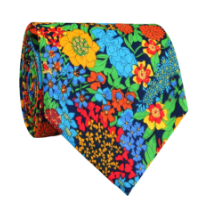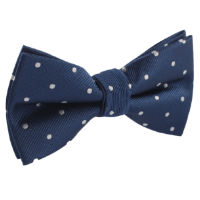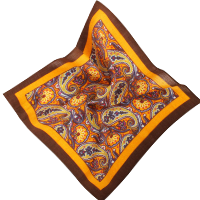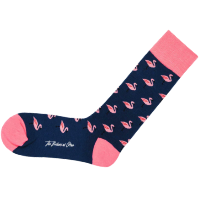How To Measure And Size Mens Dress Shirts
Finding the perfect fit for a men's dress shirt, including men's wrinkle-free dress shirts, can transform your wardrobe and elevate your style. This guide will help you accurately measure and size men's dress shirts, ensuring a perfect fit that complements your physique and enhances your appearance.
Why Dress Shirt Measurements Matter
Why do some guys look great in their dress shirts? It's not about body shape—it's all about wearing the right fit. Like a woman's little black dress, a well-fitted dress shirt can make a lasting impression, so avoiding anything too tight or baggy is essential. The right fit and the suitable dress shirt material will ensure that your shirt perfectly shapes your physique to keep you comfortable and stylish all day and night.
Measuring yourself accurately ensures a great fit, whether off-the-rack or custom-made. Accessories like novelty ties and antique cufflinks will refine your look and help you stand out in any crowd.
Key Measurements for a Perfectly Fitted Dress Shirt
You must accurately measure several vital areas to find the best fit for your dress shirt. Knowing how to read men's dress shirt sizes is essential for interpreting these measurements correctly. Here's a step-by-step guide on how to do it:
Neck Measurement
How to Measure: Wrap a flexible measuring tape around the base of your neck, where your collar would usually sit. Leave enough room for one finger to fit comfortably between the tape and your neck.
Why It Matters: A properly fitted collar should not feel tight or restrictive. It should sit comfortably around your neck without pressing into your skin, allowing you to move and breathe easily.
Chest Measurement
How to Measure: Wrap the tape measure around the fullest part of your chest, ensuring it passes under your armpits and across your shoulder blades. Keep the tape parallel to the ground and relax your arms.
Why It Matters: This measurement ensures the shirt fits well across your chest and back, allowing for comfortable movement without being too tight or loose.
Waist Measurement
How to Measure: Measure around your natural waistline, which is usually at the level of your navel. Keep the tape snug but not tight, and ensure it is level.
Why It Matters: A correctly fitted waist prevents the shirt from bunching or billowing, creating a sleek and tailored look.
Sleeve Length Measurement
How to Measure: Start from the centre of the back of your neck, go over your shoulder, and measure down to your wrist bone. Keep your arm slightly bent for an accurate measurement.
Why It Matters: Proper sleeve length ensures that the cuffs sit at the base of your thumb when your arms are at your sides, providing a polished and professional appearance.
Shoulder Width Measurement
How to Measure: Measure from the edge of one shoulder to the edge of the other, keeping the tape straight across your back.
Why It Matters: The shoulder seam should align with the natural curve of your shoulder. If the seam is too broad or narrow, the shirt will not drape properly and can restrict movement.
Shirt Length Measurement
How to Measure: Measure from the base of your neck to the desired length, depending on whether you plan to tuck in the shirt or wear it untucked.
Why It Matters: The length of a shirt should be proportional to your torso and preference so that it can stay tucked in comfortably or look appropriately untucked.
Different Dress Shirt Fits
Choosing the right fit is as important as the measurements themselves. Whether you're pairing your shirt with neckties or slim ties, the fit significantly influences your overall appearance.
Slim Fit
Characteristics: Slim-fit shirts are tailored closer to the body, with narrower sleeves and a tapered waist. They create a sleek, modern silhouette.
Best For: Men with a lean or athletic build who prefer a contemporary, form-fitting style.
Regular Fit
Characteristics: Regular-fit shirts have a more relaxed cut, offering a comfortable balance between a tailored and roomy fit. They provide more space in the chest and waist.
Best For: Men with average builds want a classic, versatile look for business and casual settings.
Relaxed Fit
Characteristics: Relaxed-fit shirts offer the most room, with a looser cut through the chest, waist, and arms. They are designed for maximum comfort and ease of movement.
Best For: Men with larger frames or those prefer a laid-back, comfortable style, perfect for casual or informal occasions.
Typical Dress Shirt Fit Issues and Solutions
Even with precise measurements, some shirts may only fit somewhat. Here's how to address common fit problems:
Tight Collar
Solution: Opt for a larger neck size or use a collar extender to add more room.
Chest or Waist Gaping
Solution: Choose a slim-fit or tailored shirt or have it altered with darts to improve the fit.
Incorrect Sleeve Length
Solution: If sleeves are too long, have them shortened by a tailor. If they're too short, try a different brand with longer sleeve options.
Custom Dress Shirts: A Perfect Fit Every Time
For those who struggle to find a suitable fit off the track, custom dress shirts are an excellent solution. They allow you to personalise every detail, from fabric and fit to collar and cuff style.
Benefits of Custom Dress Shirts
- Perfect Fit: Tailored to your exact measurements for a flawless fit.
- Personalised Style: Choose your preferred fabric, colours, and details.
- Comfort: Designed to move with your body, offering unmatched comfort.
Frequently Asked Questions
How do I measure my neck size for a dress shirt?
Wrap measuring tape around the base of your neck, just below the Adam's apple, ensuring it's snug but not tight. Add half an inch for comfort.
What's the difference between slim-fit and regular-fit shirts?
Slim-fit shirts are tailored closer to the body with a tapered waist, while regular-fit shirts offer a more relaxed cut through the chest and waist.
How do I measure my sleeve length correctly?
Start measuring from the back of your neck, over your shoulder, and down to your wrist bone, keeping your arm slightly bent.
What does a shirt size like '15 34/35' mean?
It indicates a neck size of 15 inches and a sleeve length range of 34 to 35 inches.
How can I determine if a shirt fits appropriately in the chest?
A well-fitting shirt should allow you to move comfortably without pulling at the buttons, with a gap of about two inches when you pinch the fabric at the chest.
What's the best way to measure shirt length?
Measure from the base of your neck to where you want the shirt to end, considering whether you'll tuck it in or wear it untucked.
How do I convert my measurements to standard shirt sizes?
Match your neck and sleeve measurements to the size chart provided by the brand, as sizing may vary between manufacturers.





